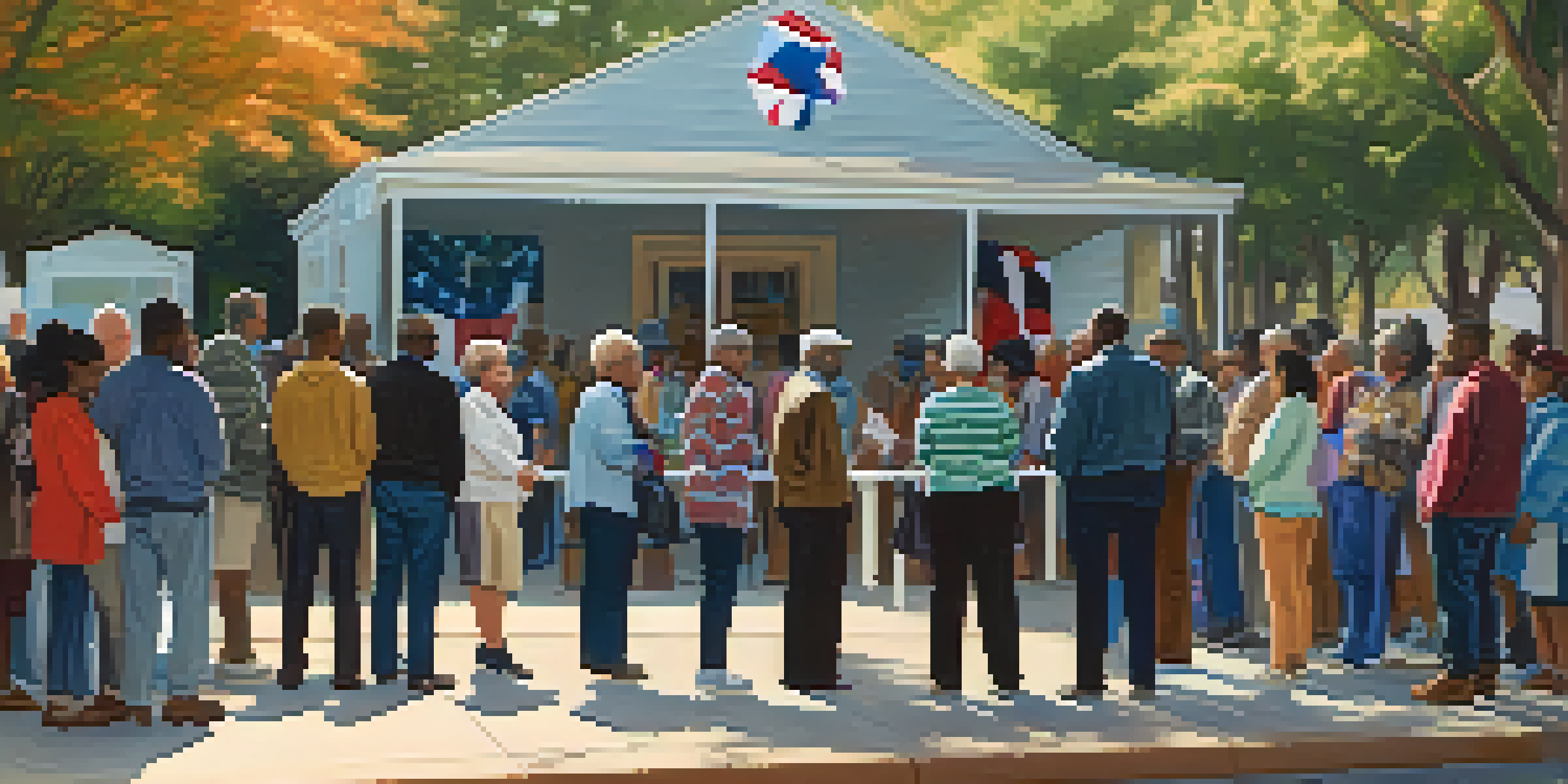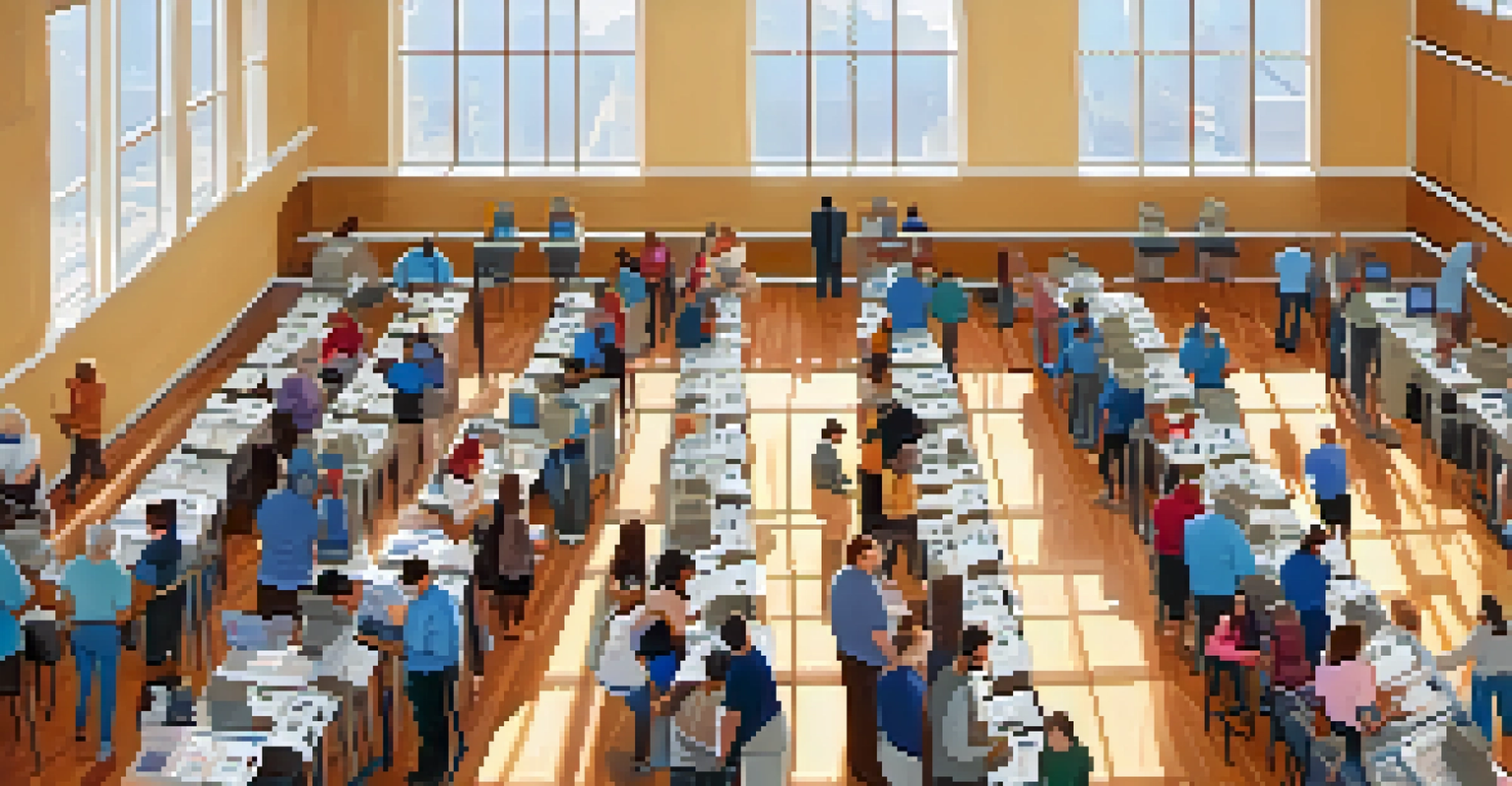Elections in Illinois: Process and Current Challenges

Overview of the Electoral Process in Illinois
Elections in Illinois are a vital part of the democratic process, allowing citizens to voice their opinions and choose their leaders. The process begins with voter registration, which can be done online, by mail, or in person, making participation accessible to many. Once registered, voters can cast their ballots in various elections, including local, state, and federal races, each with its own significance.
Voting is not only our right; it is our power.
In Illinois, elections are held on the first Tuesday after the first Monday in November, a schedule established by law. During these elections, voters face choices not only for candidates but also for referendums and amendments that affect their communities. The state employs a mix of electronic and paper ballots, ensuring that the voting process remains secure and efficient.
Understanding this process is crucial for voters, as it empowers them to take an active role in shaping their government. By participating, citizens can influence issues that matter to them, from education to healthcare. Awareness of election dates, registration deadlines, and voting methods helps ensure that every voice is heard.
Voter Registration and Eligibility Requirements
To participate in elections, Illinois residents must meet specific eligibility requirements. Generally, voters must be U.S. citizens, at least 18 years old by election day, and residents of the precinct where they intend to vote. Additionally, individuals should not be currently serving a sentence for a felony conviction, including parole or probation.

Voter registration is straightforward, with options available to suit diverse needs. For those who prefer the digital route, online registration is available, while others can choose traditional methods like mail-in forms or in-person registration at designated locations. However, it's important to keep track of deadlines, as registration typically closes a few days before an election.
Voter Registration Simplified
Illinois offers various voter registration options, including online and same-day registration, to enhance accessibility for all citizens.
Illinois also offers same-day registration on election day, allowing those who missed the deadline to still make their voices heard. This feature is particularly beneficial for individuals who may have moved or changed their name and haven't updated their registration. By providing various registration options, Illinois aims to enhance voter participation and ensure that everyone has the opportunity to vote.
Voting Methods Available in Illinois
Illinois offers several voting methods to accommodate the diverse needs of its residents. Voters can choose to cast their ballot in person on election day, during early voting periods, or by mail through absentee voting. Each method has its own advantages, allowing individuals to select what works best for their situation.
The future depends on what you do today.
Early voting in Illinois typically begins 40 days before an election, providing ample opportunity for those with busy schedules or other commitments. Voters can visit designated early voting locations to cast their ballots, ensuring they avoid long lines on election day. This flexibility encourages higher turnout and makes the process more convenient.
Mail-in voting, or absentee voting, is another popular option, particularly for those who may be unable to vote in person due to health issues or travel. Voters can request a mail-in ballot and submit it before the election deadline, ensuring their vote is counted. This variety of voting methods helps to enhance accessibility and inclusivity in the electoral process.
The Role of Polling Places and Election Officials
Polling places are crucial to the electoral process, serving as the physical locations where voters cast their ballots. In Illinois, these locations are determined by a voter’s registered address, and they can vary significantly depending on the precinct. It’s important for voters to know their designated polling place well ahead of election day to avoid confusion.
Election officials play a vital role in facilitating the voting process at these polling locations. They are responsible for ensuring that the election runs smoothly, assisting voters with any questions or concerns, and maintaining the integrity of the voting process. Trained to handle various situations, these officials help maintain order and security, which is essential for a fair election.
Multiple Voting Methods Available
Residents can vote in person, during early voting, or by mail, allowing flexibility to accommodate different schedules and needs.
Additionally, election officials are tasked with counting votes and ensuring that results are reported accurately. This transparency is crucial for public trust in the electoral process. By understanding the importance of polling places and the role of election officials, voters can appreciate the effort that goes into making elections fair and democratic.
Current Challenges Facing Elections in Illinois
Despite the robust framework for elections in Illinois, several challenges persist that can impact voter participation and trust. One significant issue is voter apathy, often driven by disillusionment with the political process or a belief that individual votes do not matter. This mindset can lead to lower turnout rates, particularly among younger voters.
Another challenge involves the administration of elections, including concerns over the security of electronic voting systems. Instances of hacking and misinformation can undermine public confidence in the electoral process. Illinois has taken steps to enhance security measures, but ongoing vigilance is necessary to address these concerns effectively.
Accessibility is also a critical issue, especially for individuals with disabilities or those living in remote areas. While Illinois has made strides in improving accessibility at polling places, ongoing efforts are needed to ensure that every citizen can participate fully in the democratic process. Addressing these challenges is essential for fostering a more engaged and trusting electorate.
Impact of Technology on Illinois Elections
Technology has significantly transformed the electoral process in Illinois, introducing both opportunities and challenges. Electronic voting systems have streamlined the voting process, making it faster and more efficient for voters. These systems allow for quicker counting of ballots and can enhance accessibility for individuals with disabilities.
However, the reliance on technology also raises concerns about security and integrity. Instances of cyberattacks on election systems in other states have heightened awareness around this issue. Illinois has invested in upgrading its election infrastructure to safeguard against potential threats, ensuring that the electoral process remains secure and trustworthy.
Challenges in Electoral Participation
Voter apathy, election security concerns, and accessibility issues pose significant challenges to participation and trust in the electoral process.
Moreover, technology plays a crucial role in voter education and engagement. Online platforms provide voters with easy access to information about candidates, issues, and voting procedures. By leveraging technology, Illinois aims to enhance civic engagement and encourage a more informed electorate, ultimately strengthening the democratic process.
Looking Ahead: The Future of Elections in Illinois
As Illinois navigates the complexities of elections, it’s essential to consider the future of the electoral process in the state. Ongoing discussions about election reforms aim to address current challenges and improve voter participation. Initiatives focusing on automatic voter registration and expanded access to mail-in voting are gaining traction.
Additionally, fostering a culture of civic engagement among younger generations is crucial. Educational programs aimed at promoting understanding of the electoral process can spark interest and encourage participation. By instilling the importance of voting early on, Illinois can cultivate a more engaged electorate in the years to come.

Ultimately, the future of elections in Illinois will depend on the collective efforts of citizens, lawmakers, and election officials to ensure that the process is fair, secure, and accessible. By addressing current challenges and embracing innovation, Illinois can strengthen its electoral process and reinforce the foundation of democracy.